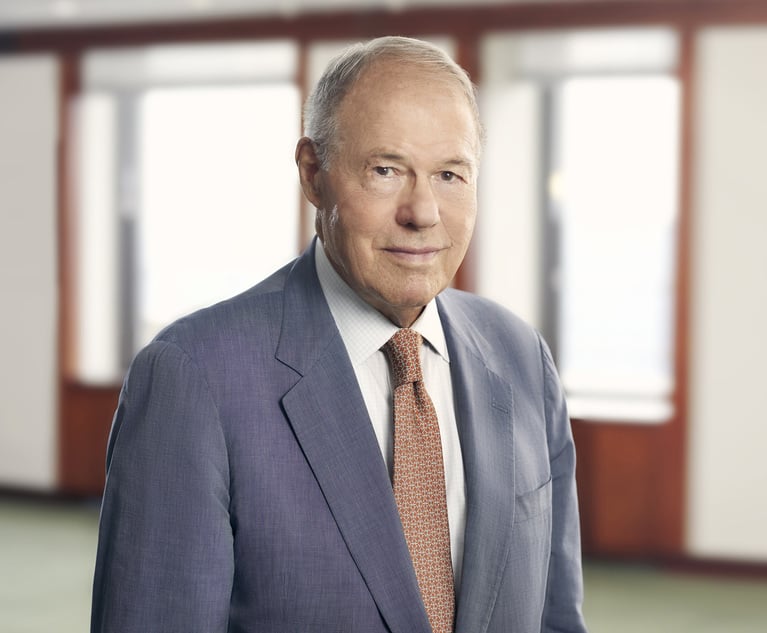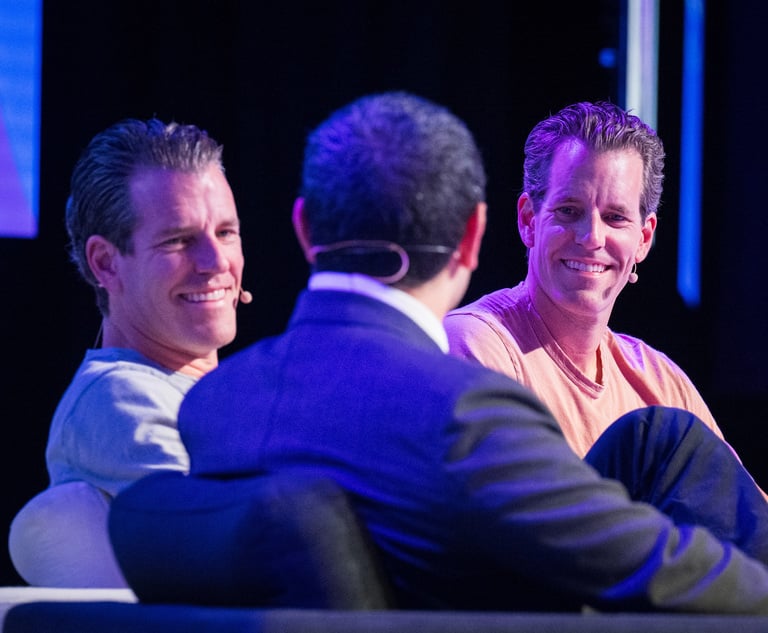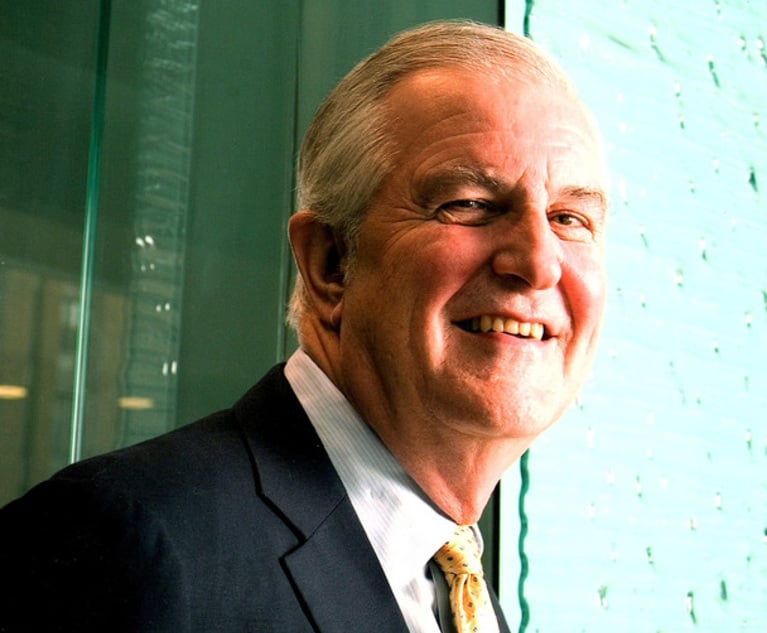Neil Gorsuch Loves His 'Dream Job,' Ignores the Criticism, Friends Say
"He is not paying attention to the newspapers, he's paying attention to briefs, and cases, and laws. He's not one for the D.C. cocktail circuit, as it were. Just not his scene, never has been," says Jamil Jaffer, a former Gorsuch clerk.
April 10, 2018 at 03:30 PM
8 minute read
 Justice Neil Gorsuch and Chief Justice John Roberts Jr. standing on the steps of the U.S. Supreme Court. Credit: Diego M. Radzinschi / ALM
Justice Neil Gorsuch and Chief Justice John Roberts Jr. standing on the steps of the U.S. Supreme Court. Credit: Diego M. Radzinschi / ALM
Neil Gorsuch's first year as a justice of the U.S. Supreme Court was not easy.
Sworn in on April 10, 2017, Gorsuch joined the court at the tail end of last term. First he had to get acclimated to the fast pace of oral arguments, and since then the slow pace of decision-making—all under the intense scrutiny of the news media and bloggers eager to chronicle his every step and misstep.
There was displeasure about where he spoke and where he dined. His sometimes condescending comments at oral argument—“I start with the text of the Constitution, always a good place to start,”—drew attention, then his super-explanatory writings spawned #GorsuchStyle commentary. His votes have been consistently conservative, some said. And oh yes, why was he so stone-faced at the first State of the Union address he attended?
We asked two lawyers who know Gorsuch well for their thoughts about his first year on the bench, and the criticism he has had to absorb—or ignore.
Jamil Jaffer clerked for Gorsuch on the U.S. Court of Appeals for the Tenth Circuit 11 years ago, and then again from April to July of 2017 at the Supreme Court. He is founder of the National Security Institute at Antonin Scalia Law School at George Mason University. Tobi Young got to know Gorsuch during a Tenth Circuit clerkship with another judge, and then at the Justice Department a dozen years ago. She is general counsel to the George W. Bush Presidential Center. We interviewed them by phone separately. The conversations were edited for length and clarity.
NLJ: How is Gorsuch doing, and is he enjoying what he is doing?
Jaffer: I think he's doing great. He has shown himself to be the same judge that he was on the Tenth Circuit, which is to say: careful, diligent and intellectual. He tries to apply the law evenly and fairly. … I think in a lot of ways, he is exactly the judge that everybody thought he was going to be. Of course, he had a long record, so it was easy to figure out, but no surprises is what I'd say, no surprises.
Young: Well, I think he's doing great, and I do think he is enjoying it. I think anyone who's heard him speak or read his writings knows that the law is a passion of his and has been, and so it seems to be a dream job for somebody who cares that deeply, enjoys getting into the nitty gritty details of the law and all the constitutional issues that a Supreme Court justice works on.
Recent commentary suggests Gorsuch is turning out to be a lockstep conservative. Do you think that criticism is fair, or do you see him as independent?
Jaffer: One thing I can tell you that neither he, nor any of the justices on the Supreme Court, think about is where the Chamber of Commerce is when deciding how to side a case. That's not how they operate, and they also don't think, 'Oh boy, I voted with Justice Thomas or Justice Kagan eight times. I need to make sure there's a ninth, or make sure there's not a ninth.' That's just not how he, nor any of the other justices, think.
Young: I do think he's independent and not ideological. There's not a lot of evidence to look through and statistics to look through quite yet, but you can look at his past, and I can tell you someone like Justice Gorsuch isn't going to change overnight. I think you're going to see a lot of times that the court will end up 9-0, or continue to have interesting splits as it always has, and so the man I know, I don't question his independence and his integrity whatsoever.
What do you think of the reports that Gorsuch is not getting along with other justices?
Jaffer: I would challenge you to find a single Supreme Court Justice who would say that, because it's not true. It's also not how they operate. I just think these stories are very gossipy, but there's no decent source behind them. Because, you know the justices aren't saying that, and I'm pretty sure their clerks aren't saying it, and if they are, they don't know what they are talking about and are talking out of school.
Young: Neil Gorsuch has always been one of the kindest, most thoughtful people I have had the privilege to work with. He's always been somebody who makes people feel special, remembers things important to them, and connects with people. He listens to people, and so I find that one really hard to believe, and I would assume over time that rumor's going to be put to rest pretty easily.
What about the #gorsuchstyle discussion, which portrayed his writing as overly explanatory and scattered with obscure references?
Jaffer: Honestly I think that his effort is to try and make the law more accessible to more people. They might criticize him for using somewhat obscure authors, but he's explaining it, so if that's all you have to criticize somebody on, it's pretty weak.
Young: My question for you would be, have other justices who have just started on the court been analyzed quite so much for one sentence or two here or there in their opinions? I find that fascinating, and I don't know. … You know, one of the things he was lauded for when he was nominated was being an exceptional writer. The litigants and the people that it will affect down the road are supposed to be able to read legal opinions and get it. He has an amazing education pedigree, and he studied in England, and so if he makes a reference about something, I think that's great.
How do you think Gorsuch is dealing with the criticism?
Jaffer: He's not reading the newspaper trying to figure out, 'What will the newspaper think about what I do?' He's trying to get the law right. … If what these critical articles are is an effort to try and get him to conform, it's going to be a failure, because he is not paying attention to the newspapers, he's paying attention to briefs, and cases, and laws. He's not one for the D.C. cocktail circuit, as it were. Just not his scene, never has been.
Young: It seems the media is treating the Supreme Court and the justices more like a Taylor Swift song and trying too hard to read meaning into their statements. It is perplexing to those of us who have been fortunate enough to work with him that our collegial mentor could be the root of such extreme speculation. From his limited time on the court, I think he has been exactly who he testified he would be. Maybe in D.C. that is a hard song to write!
So, why was he so stone-faced at the State of the Union address?
Jaffer: I think this goes back to him and the way he sees his role, which is: it's not his job as a judge to smile or applaud the president, or scowl at the president, or to smile or scowl at the people who are standing up or sitting down at the State of the Union. It's the job of the judge to take the law, interpret it, apply it fairly to the litigants before him, and make decisions, right? I think he was just trying to be evenhanded. The funny thing is, if you look at all the other justices, historically, that's what they all do. None of the Justices are getting up there and standing up there and applauding. Yet you don't see any criticism of them; that's because it is exactly what they are expected to do.
Young: What kind of face should you make, you know? That was a can't-win situation, but I have to say that is one of the most baffling things I have read.
Read more:
This content has been archived. It is available through our partners, LexisNexis® and Bloomberg Law.
To view this content, please continue to their sites.
Not a Lexis Subscriber?
Subscribe Now
Not a Bloomberg Law Subscriber?
Subscribe Now
NOT FOR REPRINT
© 2025 ALM Global, LLC, All Rights Reserved. Request academic re-use from www.copyright.com. All other uses, submit a request to [email protected]. For more information visit Asset & Logo Licensing.
You Might Like
View All

‘Not a Regulatory Gray Area’: CFTC Secures $5M Settlement From Gemini
3 minute read

Corporate Disclosure Law Enjoys ‘Presumption of Constitutionality,’ Feds Tell Justices
Trending Stories
Who Got The Work
Michael G. Bongiorno, Andrew Scott Dulberg and Elizabeth E. Driscoll from Wilmer Cutler Pickering Hale and Dorr have stepped in to represent Symbotic Inc., an A.I.-enabled technology platform that focuses on increasing supply chain efficiency, and other defendants in a pending shareholder derivative lawsuit. The case, filed Oct. 2 in Massachusetts District Court by the Brown Law Firm on behalf of Stephen Austen, accuses certain officers and directors of misleading investors in regard to Symbotic's potential for margin growth by failing to disclose that the company was not equipped to timely deploy its systems or manage expenses through project delays. The case, assigned to U.S. District Judge Nathaniel M. Gorton, is 1:24-cv-12522, Austen v. Cohen et al.
Who Got The Work
Edmund Polubinski and Marie Killmond of Davis Polk & Wardwell have entered appearances for data platform software development company MongoDB and other defendants in a pending shareholder derivative lawsuit. The action, filed Oct. 7 in New York Southern District Court by the Brown Law Firm, accuses the company's directors and/or officers of falsely expressing confidence in the company’s restructuring of its sales incentive plan and downplaying the severity of decreases in its upfront commitments. The case is 1:24-cv-07594, Roy v. Ittycheria et al.
Who Got The Work
Amy O. Bruchs and Kurt F. Ellison of Michael Best & Friedrich have entered appearances for Epic Systems Corp. in a pending employment discrimination lawsuit. The suit was filed Sept. 7 in Wisconsin Western District Court by Levine Eisberner LLC and Siri & Glimstad on behalf of a project manager who claims that he was wrongfully terminated after applying for a religious exemption to the defendant's COVID-19 vaccine mandate. The case, assigned to U.S. Magistrate Judge Anita Marie Boor, is 3:24-cv-00630, Secker, Nathan v. Epic Systems Corporation.
Who Got The Work
David X. Sullivan, Thomas J. Finn and Gregory A. Hall from McCarter & English have entered appearances for Sunrun Installation Services in a pending civil rights lawsuit. The complaint was filed Sept. 4 in Connecticut District Court by attorney Robert M. Berke on behalf of former employee George Edward Steins, who was arrested and charged with employing an unregistered home improvement salesperson. The complaint alleges that had Sunrun informed the Connecticut Department of Consumer Protection that the plaintiff's employment had ended in 2017 and that he no longer held Sunrun's home improvement contractor license, he would not have been hit with charges, which were dismissed in May 2024. The case, assigned to U.S. District Judge Jeffrey A. Meyer, is 3:24-cv-01423, Steins v. Sunrun, Inc. et al.
Who Got The Work
Greenberg Traurig shareholder Joshua L. Raskin has entered an appearance for boohoo.com UK Ltd. in a pending patent infringement lawsuit. The suit, filed Sept. 3 in Texas Eastern District Court by Rozier Hardt McDonough on behalf of Alto Dynamics, asserts five patents related to an online shopping platform. The case, assigned to U.S. District Judge Rodney Gilstrap, is 2:24-cv-00719, Alto Dynamics, LLC v. boohoo.com UK Limited.
Featured Firms
Law Offices of Gary Martin Hays & Associates, P.C.
(470) 294-1674
Law Offices of Mark E. Salomone
(857) 444-6468
Smith & Hassler
(713) 739-1250










